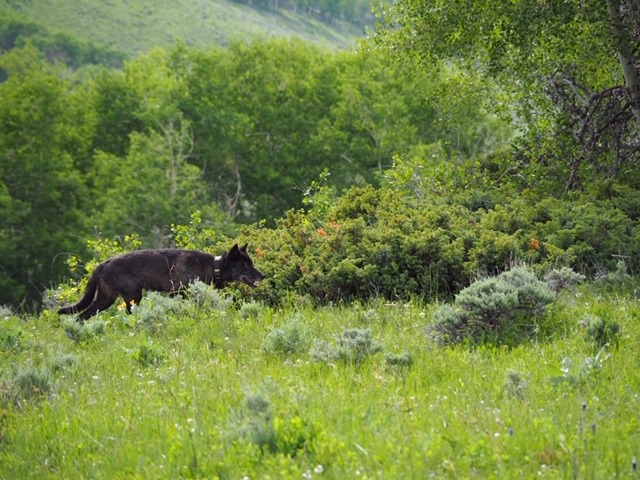
Don Gittleson had a bad feeling when he saw crows and magpies circling one of his pastures.
The rancher had watched wolves multiply around his property near Walden, Colo. for months. A single black-furred wolf soon gained a mate. Gov. Jared Polis, a known wolf enthusiast, celebrated by dubbing the couple "John and Jane wolf."
The pair later spawned a litter of pups, marking the first known instance of wolf breeding in Colorado since hunters and trappers eradicated the species in the 1940s.
Gittleson soon discovered the wolves had achieved another milestone last Saturday night. The next morning, he found the birds had been scavenging a 550-pound heifer calf. Wolf tracks surround the carcass, which had been picked clean to its ribcage. The Colorado Cattlemen’s Association, a trade group representing ranchers, believes it’s the first known instance of the predators killing Colorado livestock in more than 70 years.
At that point, Gittleson realized he had a choice. He could illegally shoot a few of the wolves himself and not ask the state to pay for his lost cattle.
"Now that would have been illegal. So what I decided to do was make a phone call," he said. "I can tell you, that's a difficult decision to make when you have your animals getting attacked."
Colorado Parks and Wildlife later confirmed wolves had, in fact, killed the heifer.
The development raises the stakes on a planned program to reimburse ranchers for livestock lost to wolves. If it’s not successful as wolves migrate into Colorado on their own, ranchers and wolf advocates agree the state could struggle with its reintroduction effort, which voters narrowly approved last year. The ballot measure requires the state to put "paws on the ground" by the end of 2023.
Gittleson is already assembling paperwork and photographs to file a claim through the existing Colorado Game Damage Program, which offers reimbursement for any property lost to elk, mountain lions, wolves and other species. Losses to "nuisance wildlife," like coyotes and pigeons, aren't covered.
He said the experience will help him decide what to do the next time wolves come for some of his cattle. After his son, Lee Gittleson, posted about the incident on Facebook, many wolf opponents called on his family to "shoot, shovel, and shut up," a practice often abbreviated to "SSS" on social media.
While he disregarded the advice this time, he plans to keep an open mind going forward despite wolves' status as a state endangered species. The protections mean anyone who kills one could face a $100,000 fine and up to a year in prison.
"If I walk out and there are wolves in the corral killing a calf, can I restrain myself? I don't know," he said.
The delicate art of livestock compensation
Terry Fankhauser, the executive vice president for the Colorado Cattleman's Association, said the incident stresses the need for fair compensation. At the moment, the state will only cover losses up to the market value of an animal, which he said neglects the other costs of raising livestock around wolves.
Some studies suggest that predators stress livestock, limiting weight gain and putting pregnancies at risk. Non-lethal methods to control wolves, like hazing and fences, can require further costs. "Those are not insignificant issues," Fankhauser said.
Other states and foreign governments have come up with a variety of programs to pay for livestock lost to wolves and other associated costs. Many have been criticized for requiring an unreasonable level of proof, which often results in some ranchers not using the programs.
To address the issue, some states determine compensation by multiplying the value of a lost animal. Washington state pays twice the total confirmed damages. Wyoming pays up to a ratio of seven to one.
Meanwhile, many European countries use a "pay-for-presence" model, where a livestock owner isn't required to prove any losses. Instead, if they're working in an area with confirmed wolves, the government sends a regular check to help cover any additional expenses.
The strategies also aren't mutually exclusive. For example, Arizona has combined the two compensation schemes to help protect Mexican gray wolves.
How Colorado may cover losses in the future
All options appear to be on the table in Colorado. The law resulting from proposition 114, the wolf reintroduction ballot measure, requires fair compensation for any livestock lost to wolves. Colorado Parks and Wildlife assembled a pair of advisory groups to help it finalize the program as one piece of a larger management and restoration plan.
In November, the groups gathered at the Cheyenne Mountain Zoo in Colorado Springs to develop a draft for a potential compensation program. Participants discussed a wide range of options, including multiplying the market value of losses and pay-for-presence programs. Travis Duncan, a Colorado Parks and Wildlife spokesperson, said a final plan likely won't be presented to state commissioners until late 2022 or early 2023.
Mike Phillips, the director of the Turner Endangered Species Fund and an advisor to the reintroduction campaign, said each approach has its merits. What matters is whether the final policy makes ranchers whole and gives them a reason to avoid future conflicts.
"Compensation is a step in the direction of resolution," he said. "Lethal control can't be the fallback position."









